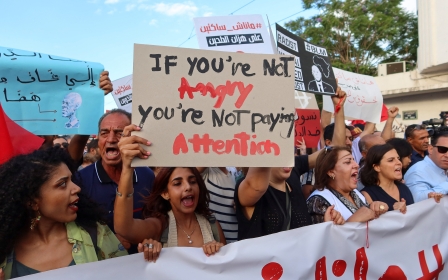Tunisia: Families of prisoners of conscience denounce 'humiliation' and 'harassment'
Since Kais Saied's power grab in the summer of 2021, during which he froze parliament and then went on to weaken opposition powers, Tunisia has been living to the rhythm of arrests of the president's critics and opponents.
Since the first wave of detentions in February 2023, more than a hundred activists, journalists, political figures and lawyers have been jailed.
The charges are multiple: alleged financial crimes, so-called "conspiracy against state security" - about 15 cases were opened in the space of 18 months - and the spread of false news or defamation on the basis of Decree 54, a piece of legislation adopted in 2022 which punishes the "disclosure of rumours or false information" with sentences of up to five years' imprisonment.
In the run-up to the presidential election, set for Sunday 6 October, the repression has intensified against the president's rivals.
In September, 97 members of Tunisia’s largest opposition party, Ennahda, were arrested. "Those detained were denied access to their lawyers for 48 hours," said Amnesty International.
New MEE newsletter: Jerusalem Dispatch
Sign up to get the latest insights and analysis on Israel-Palestine, alongside Turkey Unpacked and other MEE newsletters
Ayachi Zammel is one of only two candidates allowed to run in the election besides Saied, while all other potential rivals have been barred. Zammel was arrested in early September on charges of false sponsorships and has so far received sentences totalling 13 years and 8 months in prison.
In increasing numbers, prisoners of conscience complain of abusive treatment in detention. Their families report regular harassment and humiliation.
Last week, Zammel's lawyer, Messaoudi Abdessatar, denounced the "human rights violations" suffered by his client.
Abdessatar noted in particular that Zammel, who faces around 30 charges in different regions, has been deprived of family visits and is therefore unable to collect the food they bring him twice a week to compensate for the absence of refectories in prisons.
Visits to prisoners have become a serious problem for families and lawyers alike.
The latter took full advantage of their right to meet their clients from the first wave of arrests in February 2023. Thanks to a quarterly visitation authorisation, they had established a rotation where, each day, one or two lawyers would visit as many prisoners as possible.
But since the spring, the rules have changed and they now need a daily permit.
"We have to go and ask for authorisation from the criminal division of the appeal court," a lawyer told Middle East Eye on condition of anonymity, as some of his colleagues have been prosecuted for discussing cases publicly.
"We usually get it at 11.30 am, then we have to go to the prison. Besides, we can only see two prisoners. And the prisoners can only see one lawyer every two days."
'Barometer of authoritarianism'
For Alexis Deswaef, a lawyer at the Brussels Bar in Belgium and vice-president of the International Federation for Human Rights (FIDH), the restrictions on visits to prisoners are a "barometer of authoritarianism in Tunisia".
"Lawyers are prevented from doing their job. And prisoners of conscience are made to struggle to prepare their defence," he told MEE.
'Lawyers are prevented from doing their job. And prisoners of conscience are made to struggle to prepare their defence'
- Alexis Deswaef, International Federation for Human Rights
The core of around 10 particularly active and high-profile Tunisian lawyers who follow the cases of political prisoners and prisoners of conscience are now exhausted.
"The colleagues who can still cope with this pace are those who have a relative in prison", one of them told MEE.
The families are also suffering. They often have to devote an entire day to the visit, which in reality only lasts for about 15 minutes. Some say they have been threatened with legal action.
Other detainees' relatives working in public service say they have been demoted.
This is the case, for example, of Sofia Ben Akla, the wife of Ghazi Chaouachi, a human rights lawyer and former secretary general of the social-democratic party Attayar, who has been incarcerated since February 2023 in the "conspiracy against state security" case.
President of a chamber at the court of cassation, Ben Akla was transferred last February - exactly one year after her husband's arrest - to the real estate court, her son Youssef wrote on social media.
Her second son, Elyes, who lives in France, was sentenced in absentia to three years in prison following a television appearance where he discussed his father's detention.
During a visit as part of a mission of the international support committee for freedoms in Tunisia, created in September by rights NGOs from 13 countries, Deswaef had the opportunity to meet the families of some detainees.
"The word humiliation came up several times. The women are at the end of their tether and are coping as best they can," he told MEE.
For the FIDH vice-president, the conditions of detention described by the inmates' relatives are "appalling".
"The detainees are treated like terrorists. This is a misuse of anti-terrorist legislation," Deswaef added.
In the "conspiracy" case, most political prisoners face more than a dozen charges, including endangering state security and participating in a terrorist organisation.
They therefore fall within the framework of the 2015 anti-terrorism law, which has been criticised by human rights defenders as being vaguely worded and likely to undermine freedoms.
'Isolated'
All this affects the morale of prisoners.
Riadh Bettaieb, former investment and international cooperation minister (2011-2013) and an Ennahda executive, was arrested on 23 February 2023.
Like the party's leader Rached Ghannouchi, Bettaieb, a French-Tunisian national, is facing prosecution in the Instalingo case, named after a digital communications company that is accused of creating Facebook pages with the aim of overthrowing the state.
He receives visits from his wife only once a week, for less than 10 minutes, like the other detainees, and from his lawyer, who is his sister, only once every 10 days.
"He is isolated," his son Anas told MEE.
"In his cell, where around 50 people live, instructions were given not to form any bonds with him. He eats alone," he said.
'It is persecution and harassment. The authoritarian regime will stop at nothing to maintain its power'
- Son of jailed politician Ghazi Chaouachi
"He cannot write. The books that are sent to him only arrive little by little. Every two or three weeks, he receives a censored newspaper with passages crossed out in black. The television set does not have news channels. It is during visits that he learns what is happening outside, particularly about the presidential election."
Bettaieb also notes that the food brought to his father is sometimes stolen: "The most blatant is for Eid, when we had given him more meat than usual and it disappeared."
In Tunisia, prisons do not have a canteen. Prisoners' families bring what is called the "basket" twice a week to feed and clothe their relatives.
Preparing the basket is an additional difficulty for families. Since the arrest in May of the lawyer and columnist Sonia Dahmani, her sister Ramla has discovered a set of rules devoid of any logic.
"Anything spicy is forbidden, only salt is allowed. She is not allowed white rice, but if you add a sauce or cumin, it goes through. Freshwater shrimps used to be allowed, but they are not any more. Apples, oranges, bananas, peaches are fine, but not apricots or watermelons."
In September, Sonia Dahmani was sentenced to eight months in prison on the basis of decree 54. She was arrested after criticising on television the "Great Replacement theory" advocated by the president on the issue of immigration, according to which sub-Saharan people want to settle permanently in the country "to change the demographic structure of Tunisia".
'Psychological rape'
Dahmani has also to deal with the prison's clothing requirements. "She has to cover her legs and arms, even to sleep. I had thought of giving her shirts to wear open over a vest top. Collars are forbidden," her sister said.
Dahmani and her fellow inmates suffered greatly from the heat last summer, even sleeping on the floor in search of coolness. In the middle of August, without explanation, the prison authorities moved them to a larger but dirtier room.
"She spent five weeks without a shower, because of a breakdown, with only one tap in the cell. One day, a lizard fell on her head. At night, cockroaches walk on her face. And there are rats coming out of the Turkish toilets," Ramla told MEE.
Dahmani has been waiting for permission to have her hair cut and dyed for four months, unlike common prisoners. Her iconic crop is no more. She now wears a white lock at the front that she styles with cooking oil.
"It may seem frivolous, but we are touching on her identity," her sister commented.
On 20 August, when she was due to appear at her appeal trial, Dahmani suffered what her sister describes as "psychological rape".
"She was stripped naked, she had to get on all fours, spread her buttocks and then on her back, still with her legs apart. She was refused a screen."
The guards also wanted to force her to wear plastic prison flip-flops and a safsari, the white veil that women accused in morality cases still wear sometimes in Tunisian courts.
Her family filed a lawsuit for abuse and torture.
'One day, a lizard fell on her head. At night, cockroaches walk on her face. And there are rats coming out of the Turkish toilets'
- Sister of jailed lawyer and columnist Sonia Dahmani
Chaouachi’s relatives are also lodging complaints.
They have appealed to the African Court on Human and Peoples' Rights and the International Criminal Court on the grounds of ill-treatment, as well as to Tunisian courts.
At the end of August, Chaouachi fell ill in his cell. The 60-year-old was denied the necessary care, his family said.
"This is blatant contempt. It is persecution and harassment. The authoritarian regime will stop at nothing to maintain its power," his son Elyes told MEE.
The lack of medical follow-up is a common concern for all the prisoners' families. The conditions for medical check-ups are particularly difficult for inmates.
"Every day, all the prisoners who need a medical examination get into the same van. And it goes around all the public hospitals to drop them off, depending on the needed specialities. As a result, they spend the whole day in the car, without even a bottle of water," a prisoner's relative told MEE.
Middle East Eye delivers independent and unrivalled coverage and analysis of the Middle East, North Africa and beyond. To learn more about republishing this content and the associated fees, please fill out this form. More about MEE can be found here.





